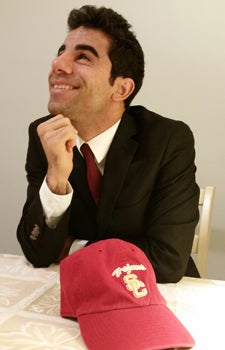The Only Way is Up
In 2009, Joseph Dorri hit rock bottom.
After clashing with his Iranian-born parents over his university and career plans, the community college graduate left home in September 2008 determined to make it on his own. After traveling in the United States and to Iran, Dorri in July, 2009, returned to his hometown of Santa Clarita, California, and started looking for work. The recession was in full swing, however, and Dorri’s job applications went unanswered. By August his savings had dwindled. He still hadn’t found work and now had only a few cents to his name.
Five years ago, the future looked bleak. But this month Dorri is graduating from USC Dornsife with a bachelor’s degree in psychology and his future sparkles with promise. His goals now include working in federal government and completing a book about education he started while homeless.
It’s hard to believe this is the same person who for months lived out of his car, showering at College of the Canyons in Santa Clarita, the community college where he had once been elected honors president and received the Most Promising Future Educator Award. Back then he had been nominated to be presented to the State Capitol as one of the top 69 students out of two million in the California community college system. But that was before he was homeless and surviving on sample cookies from grocery stores and ketchup packets from fast-food restaurants.
“I was in a very low place,” said Dorri, who remembers swaying back and forth in the grocery store, lightheaded from hunger. “I felt depressed, lonely, unsuccessful. It was as if I had put on a Halloween costume and I was walking around disguised as a homeless person.”
Except it wasn’t a costume.
“People just assume that because you’re homeless, you’re unambitious, don’t take initiative and have no aspirations,” he said. “You feel this awful kind of stigma.”
Even though his parents lived just five minutes away, Dorri didn’t want to return home.
“I wanted to start with nothing and figure it out on my own, be able to say, ‘Yes, I have a brain, I am capable.’ ”
Despite his dire circumstances, Dorri had two things going for him. He was determined and he was resourceful.
During the day, he worked on his book. At night, he returned to the college campus and collected discarded bottles to recycle, using the money to buy bread.
“I collected the bottles at night and recycled them early in the morning because I didn’t want to be seen by my peers,” Dorri said. “I was embarrassed.”
Eventually, he managed to save enough to buy a $10 prepaid phone card.
“Now I had a number where potential employers could contact me. I went to the public library and printed copies of my resume for free,” he said. This time, Dorri was successful, finding two jobs to get himself back on his feet — one at Six Flags Magic Mountain amusement park and another at Target.

Bolstered by his ability to dig himself out of a hole, Dorri decided to give his family another shot. “I thought, ‘Now I’m a bit wiser, let’s see if we can get along,’ ” he said. “And we developed a relationship.”
In the meantime, Dorri had decided to give something else a shot — further education.
Following high school, he had received a biblical certificate from Eugene Bible College, now New Hope Christian College, in Eugene, Oregon, before earning an associate’s degree at College of the Canyons.
After his period of homelessness, Dorri applied and was accepted to USC as a financially independent student. He was accepted with a $30,000 yearly university grant that has increased over the years.
“I didn’t plan on coming here,” Dorri said. “USC was a dream school when I was attending community college. It’s superb that a school I never thought I would be able to attend made it possible for me to do so. And now I’m graduating this May.
“What is wonderful at USC is that if there is a student with a financial need the university provides generous support.”
At USC Dornsife, Dorri explored courses in neuroscience, political science, economics and international relations.
“I used my time at USC as an opportunity to find out what I really want to do, not what I am expected to do,” Dorri said. “That was why I originally separated from my family, and had no financial support.
“I am interested in people, how they think, reason and make choices. Going though school I was very outgoing and people-oriented so I think majoring in psychology is partially also to understand myself.”
Dorri also took four graduate courses in psychology, an experience he described as “a beautiful thing at a private university.”
He credits William G. Wagner, professor of physics and electrical engineering, for helping develop his interest in government and consulting.
“One of USC’s major qualities is the faculty and their ability and willingness to interact with undergrad students. Professor Wagner exemplifies this.”
Another inspiration has been psychologist Philip Zimbardo, a professor emeritus at Stanford University, whom he met at the 2009 Western Psychological Association Convention. Zimbardo is the founder and president of the Heroic Imagination Project and former president of the American Psychology Association.
“Both these mentors have been very encouraging and supportive and have helped me stay focused,” Dorri said.
After graduating Dorri plans to investigate careers in government. He also plans to rewrite his book about education, focusing on high school graduates. A strong believer in paying it forward, “just as USC has done for me,” Dorri hopes to pass along the knowledge and wisdom he has gained over the years.
Dorri’s advice for students?
“Find three things: what success means to you, a good mentor and ways to help others despite your own predicament.”